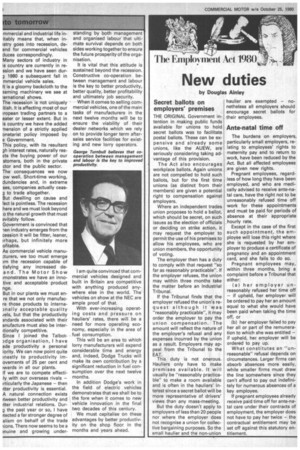New duties
Page 98

If you've noticed an error in this article please click here to report it so we can fix it.
by Douglas Ainley Secret ballots on employers' premises
THE ORIGINAL Government intention in making public funds available for unions to hold secret ballots was to facilitate postal ballots. These can be expensive and already some unions, like the AUEW, are seriously considering taking advantage of this provision.
The Act also encourages workplace ballots. Again unions are not compelled to hold such ballots, but for the first time unions (as distinct from their members) are given a potential right to compensation against employers.
Where an independent trades union proposes to hold a ballot, which should be secret, on such issues as the election of officials or deciding on strike action, it may request the employer to permit the use of his premises to allow his employees, who are union members, the opportunity of voting.
The employer then has a duty to comply with that request "so far as reasonably practicable". If the employer refuses, the union may within three months take the matter before an Industrial Tribunal.
If the Tribunal finds that the employer refused the union's request although it was "reasonably practicable", it may order the employer to pay the union compensation. The amount will reflect the nature of the employer's refusal and any expenses incurred by the union as a result. Employers may appeal from the Tribunal to the EAT.
This duty is not onerous. Hauliers only have to make premises available. It will usually be "reasonably practicable" to make a room available and is often in the hauliers' interest since a secret ballot will be more representative of drivers' views than any mass-meeting.
But the duty doesn't apply to employers of less than 20 people nor where the employer does not recognise a union for collective bargaining purposes. So the small haulier and the non-union haulier are exempted — nonetheless all employers should encourage secret ballots for their employees.
Ante-natal time off
The burdens on employers, particularly small employers, relating to employees' rights to maternity pay and to return to work, have been reduced by the Act. But all affected employees are given new rights.
Pregnant employees, regardless of how long they have been employed, and who are medically advised to receive ante-natal care, have the right not to be unreasonably refused time off work for these appointments and must be paid for periods of absence at their appropriate hourly rate.
Except in the case of the first such appointment, the employee will lose this right where she is requested by her employer to produce a certificate of pregnancy and an appointment card, and she fails to do so.
Pregnant employees may, within three months, bring a complaint before a Tribunal that either: (a) her employer unreasonably refused her time off — if upheld, her employer will be ordered to pay her an amount equal to what she would have been paid when taking the time off, or (b) her employer failed to pay her all or part of the remuneration to which she was entitled — if upheld, her employer will be ordered to pay up.
What constitutes an "unreasonable" refusal depends on circumstances. Larger firms can absorb absences more easily, while smaller firms must draw the line somewhere since they can't afford to pay out indefinitely for numerous absences of a key employee.
If pregnant employees already receive paid time off for ante-natal care under their contracts of employment, the employer does not have to pay her twice — the contractual entitlement may be set off against this statutory entitlement.
























































































































































